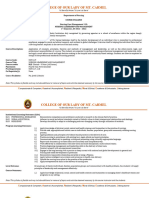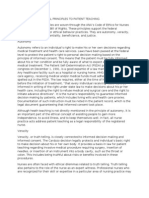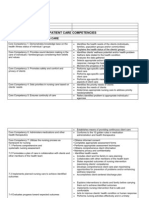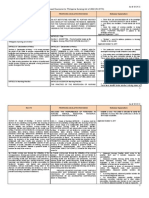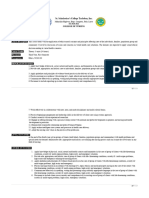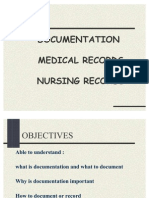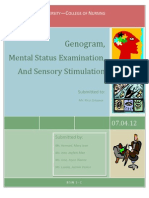The Icn Code of Ethics For Nurses
The Icn Code of Ethics For Nurses
Uploaded by
Jazmin Venice LasalaCopyright:
Available Formats
The Icn Code of Ethics For Nurses
The Icn Code of Ethics For Nurses
Uploaded by
Jazmin Venice LasalaOriginal Description:
Original Title
Copyright
Available Formats
Share this document
Did you find this document useful?
Is this content inappropriate?
Copyright:
Available Formats
The Icn Code of Ethics For Nurses
The Icn Code of Ethics For Nurses
Uploaded by
Jazmin Venice LasalaCopyright:
Available Formats
Code of EthicsFilipino Nurses Code of EthicsInternational Council of Nurses Ethical and Bioethical Principles
Professional and Personal Development:
Ethico-Moral Aspects
GROUP 4 (BSN IV-D)
Ms. Blanco, Lorraine Ms. Lasala, Jazmin Venice Ms. Lumansoc, Sheen Ms. Pineda, Donna Mr. Quipanes, Jan Mr. Sensontic, June Rich
THE ICN CODE OF ETHICS FOR NURSES An international code of ethics for nurses was first adopted by the International Council of Nurses (ICN) in 1953. It has been revised and reaffirmed at various times since, most recently with this review and revision completed in 2005. Nurses have four fundamental responsibilities: to promote health, to prevent illness, to restore health and to alleviate suffering. The need for nursing is universal. Inherent in nursing is respect for human rights, including cultural rights, the right to life and choice, to dignity and to be treated with respect. Nursing care is respectful of and unrestricted by considerations of age, color, creed, culture, disability or illness, gender, sexual orientation, nationality, politics, race or social status. Nurses render health services to the individual, the family and the community and co-ordinate their services with those of related groups. THE ICN CODE The ICN Code of Ethics for Nurses has four principal elements that outline the standards of ethical conduct. ELEMENTS OF THE CODE 1. NURSES AND PEOPLE The nurses primary professional responsibility is to people requiring nursing care. In providing care, the nurse promotes an environment in which the human rights, values, customs and spiritual beliefs of the individual, family and community are respected. The nurse ensures that the individual receives sufficient information on which to base consent for care and related treatment. The nurse holds in confidence personal information and uses judgment in sharing this information. The nurse shares with society the responsibility for initiating and supporting action to meet the health and social needs of the public, in particular those of vulnerable populations. The nurse also shares responsibility to sustain and protect the natural environment from depletion, pollution, degradation and destruction. 2. NURSES AND PRACTICE The nurse carries personal responsibility and accountability for nursing practice, and for maintaining competence by continual learning. The nurse maintains a standard of personal health such that the ability to provide care is not compromised. The nurse uses judgment regarding individual competence when accepting and delegating responsibility. The nurse at all times maintains standards of personal conduct which reflect well on the profession and enhance public confidence. The nurse, in providing care, ensures that use of technology and scientific advances are compatible with the safety, dignity and rights of people. 3. NURSES AND THE PROFESSION The nurse assumes the major role in determining and implementing acceptable standards of clinical nursing practice, management, research and education. The nurse is active in developing a core of research-based professional knowledge. The nurse, acting through the
professional organization, participates in creating and maintaining safe, equitable social and economic working conditions in nursing. 4. NURSES AND CO-WORKERS The nurse sustains a co-operative relationship with co-workers in nursing and other fields. The nurse takes appropriate action to safeguard individuals, families and communities when their health is endangered by a coworker or any other person. SUGGESTIONS FOR USE OF THE ICN CODE OF ETHICS FOR NURSES The ICN Code of Ethics for Nurses is a guide for action based on social values and needs. It will have meaning only as a living document if applied to the realities of nursing and health care in a changing society. To achieve its purpose the Code must be understood, internalized and used by nurses in all aspects of their work. It must be available to students and nurses throughout their study and work lives. APPLYING THE ELEMENTS OF THE ICN CODE OF ETHICS FOR NURSES The four elements of the ICN Code of Ethics for Nurses: nurses and people, nurses and practice, nurses and the profession, and nurses and co-workers, give a framework for the standards of conduct. The following chart will assist nurses to translate the standards into action. Nurses and nursing students can therefore: Study the standards under each element of the Code. Reflect on what each standard means to you. Think about how you can apply ethics in your nursing domain: practice, education, research or management. Discuss the Code with co-workers and others. Use a specific example from experience to identify ethical dilemmas and standards of conduct as outlined in the Code. Identify how you would resolve the dilemmas. Work in groups to clarify ethical decision making and reach a consensus on standards of ethical conduct. Collaborate with your national nurses association, co-workers, and others in the continuous application of ethical standards in nursing practice, education, management and research.
Element of the Code # 1: NURSES AND PEOPLE
Practitioners and Managers Provide care that respects human rights and is sensitive to the values, customs and beliefs of all people. Provide continuing education in ethical issues. Educators and Researchers In curriculum include references to human rights, equity, justice, solidarity as the basis for access to care. Provide teaching and learning opportunities for ethical issues and decision making. National Nurses Associations Develop position statements and guidelines that support human rights and ethical standards. Lobby for involvement of nurses in ethics review committees.
Provide sufficient information to permit informed consent and the right to choose or refuse treatment. Use recording and information management systems that ensure confidentiality. Develop and monitor environmental safety in the workplace. Practitioners and Managers Establish standards of care and a work setting that promotes safety and quality care. Establish systems for professional appraisal, continuing education and systematic renewal of licensure to practice. Monitor and promote the personal health of nursing staff in relation to their competence for practice. Practitioners and Managers Set standards for nursing practice, research, education and management.
Provide teaching/learning opportunities related to informed consent. Introduce into curriculum concepts of privacy and confidentiality. Sensitize students to the importance of social action in current concerns. Educators and Researchers Provide teaching/learning opportunities that foster lifelong learning and competence for practice. Conduct and disseminate research that shows links between continual learning and competence to practice. Promote the importance of personal health and illustrate its relation to other values.
Provide guidelines, position statements and continuing education related to informed consent. Incorporate issues of confidentiality and privacy into a national code of ethics for nurses. Advocate for safe and healthy environment.
Element of the Code # 2: NURSES AND PRACTICE
National Nurses Associations Provide access to continuing education, through journals, conferences, distance education, etc. Lobby to ensure continuing education opportunities and quality care standards.
Promote healthy lifestyles for nursing professionals. Lobby for healthy work places and services for nurses. National Nurses Associations Collaborate with others to set standards for nursing education, practice, research and management. Develop position statements, guidelines and standards related to nursing research.
Element of the Code # 3: NURSES AND THE PROFESSION
Educators and Researchers Provide teaching/learning opportunities in setting standards for nursing practice, research, education and management. Conduct, disseminate and utilize research to advance the nursing profession.
Foster workplace support of the conduct, dissemination and utilization of research related to nursing and health.
Promote participation in national nurses associations so as to create favorable socio-economic conditions for nurses.
Sensitize learners to the importance of professional nursing associations.
Lobby for fair social and economic working conditions in nursing. Develop position statements and guidelines in workplace issues.
Element of the Code #4: NURSES AND CO-WORKERS
Practitioners and Managers Create awareness of specific and overlapping functions and the potential for interdisciplinary tensions. Develop workplace systems that support common professional ethical values and behavior. Develop mechanisms to safeguard the individual, family or community when their care is endangered by health care personnel. Educators and Researchers Develop understanding of the roles of other workers. National Nurses Associations Stimulate co-operation with other related disciplines.
Communicate nursing ethics to other professions.
Develop awareness of ethical issues of other professions.
Instill in learners the need to safeguard the individual, family or community when care is endangered by health care personnel.
Provide guidelines, position statements and discussion for a related to safeguarding people when their care is endangered by health care personnel.
DISSEMINATION OF THE ICN CODE OF ETHICS FOR NURSES To be effective the ICN Code of Ethics for Nurses must be familiar to nurses. We encourage you to help with its dissemination to schools of nursing, practicing nurses, the nursing press and other mass media. The Code should also be disseminated to other health professions, the general public, consumer and policy-making groups, human rights organizations and employers of nurses.
You might also like
- PPNPSDocument4 pagesPPNPSMark Zedrix Mediario100% (2)
- Ethico Legal and Moral Considerations in Nursing Leadership ManagementDocument238 pagesEthico Legal and Moral Considerations in Nursing Leadership ManagementEdelrose Lapitan100% (1)
- The Ethic of Care: A Moral Compass for Canadian Nursing Practice - Revised EditionFrom EverandThe Ethic of Care: A Moral Compass for Canadian Nursing Practice - Revised EditionNo ratings yet
- NCM 119 Course Syllabus Nursing Leadership & MGT RLE S1 21-22Document11 pagesNCM 119 Course Syllabus Nursing Leadership & MGT RLE S1 21-22MA. JYRELL BONITONo ratings yet
- Nursing LeadershipDocument4 pagesNursing LeadershipClancy Anne Garcia Naval0% (1)
- Application of Ethical PrinciplesDocument3 pagesApplication of Ethical Principlesponce_0808No ratings yet
- Organizing and Nursing TheoriesDocument21 pagesOrganizing and Nursing TheoriesARISNo ratings yet
- Course Outline NCMDocument4 pagesCourse Outline NCMIan Kenneth Da SilvaNo ratings yet
- Nursin G: Code of EthicsDocument32 pagesNursin G: Code of EthicsKaren Kate AblesNo ratings yet
- Prof. AdjustmentDocument111 pagesProf. AdjustmentDianne Kate CadioganNo ratings yet
- Professional AdjustmentDocument140 pagesProfessional AdjustmentRaquel M. Mendoza100% (1)
- NUR 4837 Chapter 9 PowerPoint Ethical and Bioethical Issues in Nursing and Health CareChapter - 09Document42 pagesNUR 4837 Chapter 9 PowerPoint Ethical and Bioethical Issues in Nursing and Health CareChapter - 09Clarisse Suan100% (1)
- Code of Ethics For Registered Nurses Board ofDocument21 pagesCode of Ethics For Registered Nurses Board ofraven riveraNo ratings yet
- Curriculum and Teaching Q N ADocument10 pagesCurriculum and Teaching Q N ARonni Mae DeazetaNo ratings yet
- Patient Care CompetenciesDocument6 pagesPatient Care Competenciesjvfaderon74100% (1)
- Marquis Chapter 04 PPT Ethics Issues in Leadership and ManagementDocument25 pagesMarquis Chapter 04 PPT Ethics Issues in Leadership and ManagementSara AssiriNo ratings yet
- Nursing Leadership and Management: Ma. Christina B. Celdran - Oraa, PHD RN Assistant ProfessorDocument29 pagesNursing Leadership and Management: Ma. Christina B. Celdran - Oraa, PHD RN Assistant ProfessorTotoh Haids100% (1)
- The Nursing Code of Ethics Its Value, Its HistoryDocument14 pagesThe Nursing Code of Ethics Its Value, Its HistoryalifahNo ratings yet
- Legal Aspects of NursingDocument9 pagesLegal Aspects of NursingleslyjoyNo ratings yet
- Code of EthicsDocument25 pagesCode of EthicsRandyNo ratings yet
- Union Christian CollegeDocument6 pagesUnion Christian CollegeSamantha Perez DumukNo ratings yet
- Code of Ethics For NursesDocument7 pagesCode of Ethics For NursesKatherine Clarisse Carvajal LavariasNo ratings yet
- Final Evaluation InpDocument124 pagesFinal Evaluation InpChristina BarrogaNo ratings yet
- Adjustment: Professional Adjustment Definition of TermsDocument57 pagesAdjustment: Professional Adjustment Definition of Termsmark OrpillaNo ratings yet
- NCM 108Document16 pagesNCM 108potaot100% (1)
- Ethico - Moral Aspect of NursingDocument37 pagesEthico - Moral Aspect of NursingMarichu Bajado100% (1)
- NCM108 Module1 Topic A 1stsem20-21Document4 pagesNCM108 Module1 Topic A 1stsem20-21mirai desuNo ratings yet
- Community Health Nursing I (Individual and Family) : Prepared By: Mrs. Lavinia T. Malabuyoc, MAN, R.NDocument48 pagesCommunity Health Nursing I (Individual and Family) : Prepared By: Mrs. Lavinia T. Malabuyoc, MAN, R.NLerma Pagcaliwangan100% (1)
- Decent Longtest Midterm ShitsDocument7 pagesDecent Longtest Midterm ShitsAnne Monique Abao Firmalan100% (1)
- Continuing Professional Development For Nurses (Student'sCopy)Document12 pagesContinuing Professional Development For Nurses (Student'sCopy)kpv454yk7mNo ratings yet
- NSG Jursiprudence NotesDocument9 pagesNSG Jursiprudence NotesIah Fernandez100% (2)
- Head NursingDocument69 pagesHead NursingGrace JPNo ratings yet
- Ncm114 Outline 2Document7 pagesNcm114 Outline 2Nilmae SinoNo ratings yet
- The Primary Barriers To An Accessible Quality Healthcare in The Philippines Are The Shortage of Hospitals and Surgical EquipmentDocument3 pagesThe Primary Barriers To An Accessible Quality Healthcare in The Philippines Are The Shortage of Hospitals and Surgical Equipmentartrei09No ratings yet
- Patient Care Safety StandardsDocument15 pagesPatient Care Safety StandardsQueen Factor Vedra100% (1)
- Paradigm Shift in Nursing Curriculum and AdministrationDocument8 pagesParadigm Shift in Nursing Curriculum and Administrationrinkai13100% (4)
- Introduction Leadership and Management in NursingDocument32 pagesIntroduction Leadership and Management in NursingFida Mindia Farotama Amalia100% (1)
- Proposed Revisions For Philippine Nursing Act of 2002 (RA 9173)Document28 pagesProposed Revisions For Philippine Nursing Act of 2002 (RA 9173)Maru AlayonNo ratings yet
- Professional Adjustment in NursingDocument6 pagesProfessional Adjustment in NursingAlly JuanezaNo ratings yet
- Approach To BSN CurriculumDocument14 pagesApproach To BSN CurriculumCheska DillupacNo ratings yet
- Evaluation ToolDocument3 pagesEvaluation Toolbulikako100% (1)
- SANC Competencies Emergency NurseDocument28 pagesSANC Competencies Emergency Nursemakabe.k02121127No ratings yet
- RA 9173 & Legal Responsibilities of NursesDocument8 pagesRA 9173 & Legal Responsibilities of Nursesrhimineecat71No ratings yet
- Code of Ethics For Nurses in The PhilippinesDocument79 pagesCode of Ethics For Nurses in The Philippinesrhimineecat71No ratings yet
- WEEK 3 NCM 119 Nursing Process and Modalities of Nursing CareDocument12 pagesWEEK 3 NCM 119 Nursing Process and Modalities of Nursing CareCha DeseoNo ratings yet
- Nursiing Management WR. Whole PackageDocument24 pagesNursiing Management WR. Whole Packageeyna30No ratings yet
- Pulido, Nathaniel T. (Quiz - Activity 6)Document2 pagesPulido, Nathaniel T. (Quiz - Activity 6)Nathaniel PulidoNo ratings yet
- Review Questions Exam 3Document9 pagesReview Questions Exam 3Nadia LoveNo ratings yet
- ADPCN Best Practices in RLE Implementation During The COVID 19 Community Quarantine and Transition PeriodDocument11 pagesADPCN Best Practices in RLE Implementation During The COVID 19 Community Quarantine and Transition PeriodCarmel Guazon100% (1)
- Nursing Leadership and ManagementDocument16 pagesNursing Leadership and ManagementMill Jan Cruz100% (1)
- Health Care EthicsDocument12 pagesHealth Care EthicsAnntel RoseNo ratings yet
- Professional Adjustment: Mila Delia M. Llanes, PHD, RN Ust College of NursingDocument45 pagesProfessional Adjustment: Mila Delia M. Llanes, PHD, RN Ust College of NursingNikkie SalazarNo ratings yet
- Module 2.1 Ethical Aspects in NursingDocument11 pagesModule 2.1 Ethical Aspects in NursingArjay Cuh-ing100% (1)
- Matrix of Proposed Revisions To RA No 9173Document25 pagesMatrix of Proposed Revisions To RA No 9173geinu17No ratings yet
- DocumentationDocument37 pagesDocumentationViviane ChinNo ratings yet
- Handouts in NCM 119Document6 pagesHandouts in NCM 119Meliza BancolitaNo ratings yet
- Professional AdjustmentDocument110 pagesProfessional AdjustmentLingayo Mikaela AmonganNo ratings yet
- Bioethics Mediation: A Guide to Shaping Shared Solutions, Revised and Expanded EditionFrom EverandBioethics Mediation: A Guide to Shaping Shared Solutions, Revised and Expanded EditionNo ratings yet
- Leaping the Hurdles: The Essential Companion Guide for International Medical Graduates on their Australian JourneyFrom EverandLeaping the Hurdles: The Essential Companion Guide for International Medical Graduates on their Australian JourneyNo ratings yet
- Pa Tho Physiology of Uterine MyomaDocument2 pagesPa Tho Physiology of Uterine Myomaghettodawg187100% (7)
- Genogram, MSE and Sensory Stimulation - Docxnd Sensory StimulationDocument22 pagesGenogram, MSE and Sensory Stimulation - Docxnd Sensory StimulationJazmin Venice LasalaNo ratings yet
- Anatomy and Physiology of The Female Reproductive SystemDocument6 pagesAnatomy and Physiology of The Female Reproductive SystemJazmin Venice LasalaNo ratings yet
- EndometritisDocument3 pagesEndometritisJazmin Venice Lasala0% (1)
- PhenylketonuriaDocument16 pagesPhenylketonuriaJazmin Venice Lasala100% (1)
- Vital Signs ObjectivesDocument3 pagesVital Signs ObjectivesJazmin Venice LasalaNo ratings yet
- Scoring Sheet MTDocument3 pagesScoring Sheet MTJonalyn BanezNo ratings yet
- Week 9 DLL MilDocument28 pagesWeek 9 DLL MilAldine RaytanNo ratings yet
- Module 1 - IntroductionDocument23 pagesModule 1 - IntroductionJay khrielNo ratings yet
- English 8 and 10 Summative Test Tos Q2-W3-4Document2 pagesEnglish 8 and 10 Summative Test Tos Q2-W3-4Janice Apole FabioNo ratings yet
- Digital NativesDocument9 pagesDigital Nativessheilagrace geronaNo ratings yet
- IquameDocument16 pagesIquameJose Paolo Espina100% (1)
- W4B MKTG MNGTDocument3 pagesW4B MKTG MNGTNezza PeterNo ratings yet
- CLIL - Definition, Benefits, Everyday PracticeDocument17 pagesCLIL - Definition, Benefits, Everyday PracticeMary MaryNo ratings yet
- 2023 Local State of ChildrenDocument12 pages2023 Local State of ChildrenRomulo Jr. SierraNo ratings yet
- Career Planning ProcessDocument5 pagesCareer Planning ProcessMohamad Shuhmy ShuibNo ratings yet
- Edt 315 Module 4 Lesson Plan Template Fixed AccessDocument4 pagesEdt 315 Module 4 Lesson Plan Template Fixed Accessapi-642840473No ratings yet
- Business Transfomational Part 1Document6 pagesBusiness Transfomational Part 1Salman RabbaniNo ratings yet
- Phase2 FormulateaplanDocument3 pagesPhase2 Formulateaplanapi-303248740No ratings yet
- Math Action Plan in ElementaryDocument5 pagesMath Action Plan in ElementaryArVin Santos100% (9)
- Personality Development For TeachersDocument21 pagesPersonality Development For TeachersJulienne Rose Penaranda SaballaNo ratings yet
- A Research Paper Presented From The Electrical Installation and Maintenance of Passionist Technological Institute IncDocument5 pagesA Research Paper Presented From The Electrical Installation and Maintenance of Passionist Technological Institute IncKoRiMaW TvNo ratings yet
- Preliminary English Test: Marta Sánchez CortésDocument1 pagePreliminary English Test: Marta Sánchez CortésBettina Claudia FerroNo ratings yet
- Communicative StrategiesDocument4 pagesCommunicative StrategiesMa Criselda Arroyo DonascoNo ratings yet
- Front Jeep CompassDocument5 pagesFront Jeep CompassGorishsharmaNo ratings yet
- Classroom Management Strategies For Effective InstructionDocument192 pagesClassroom Management Strategies For Effective InstructionRizwan AliNo ratings yet
- Elearning ProfessionalDocument27 pagesElearning ProfessionalAlin2003100% (2)
- Daily Lesson Log: Introduction To The Philosophy of The Human PersonDocument3 pagesDaily Lesson Log: Introduction To The Philosophy of The Human PersonMilcah Roselle CandaNo ratings yet
- Final Accomplishment Report (Jordan G. Pacle)Document9 pagesFinal Accomplishment Report (Jordan G. Pacle)Zaira Mae GarciaNo ratings yet
- Management Skills For ResumeDocument4 pagesManagement Skills For Resumec2znbtts100% (1)
- PhonemeDocument4 pagesPhonemealialim83No ratings yet
- B2N Into-Nature EnglishDocument86 pagesB2N Into-Nature EnglishemiliaNo ratings yet
- The Problems of Teaching Geospatial Technology in Developing Countries Concepts Curriculum and Implementation in IndonesiaDocument12 pagesThe Problems of Teaching Geospatial Technology in Developing Countries Concepts Curriculum and Implementation in IndonesiaSalsabilaNo ratings yet
- Calling AcceleratorDocument19 pagesCalling AcceleratorRakesh GowdaNo ratings yet
- Tutorial Letter 101/0/2024: Geography of People - Resource Interaction in The Global SouthDocument15 pagesTutorial Letter 101/0/2024: Geography of People - Resource Interaction in The Global SouthLandiwe LangaNo ratings yet
- Building CapacityDocument9 pagesBuilding CapacityjezreelNo ratings yet



